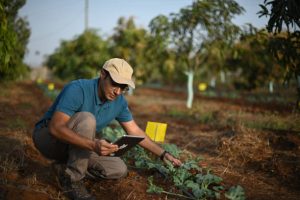Is Agricultural Economics a Good Course to Study in Nigeria?
Is agricultural economics a good course to study in Nigeria? Yes, agricultural economics is one of the best courses to study in Nigeria.
For some time now, I have received several questions concerning the profitability of agricultural economics in Nigeria.
So I had to make some series of research and I found out that this course is very profitable in Nigeria.
Agricultural economics is not so popular in Nigeria compared to courses like medicine or law, so for this reason many people can’t tell how profitable this course can be.
But I can tell you for a fact that this course presents ample job opportunities and amazing career prospects to graduates.
A career in agricultural economics is worth it and can be very rewarding and fulfilling.
In this article, we shall explore the overview of agricultural economics in Nigeria as well as other things you need to know.
So by the end of this article, you will be able to tell if agricultural economics is the ideal career path for you.
Ready? Let’s go!
Also Read: Can An Agricultural Economist Work in a Bank in Nigeria?
Overview of Agricultural Economics Course in Nigeria

An agricultural economics course in Nigeria is an exciting journey that delves into the economic aspects of agriculture.
It equips students with the knowledge and skills to understand and tackle economic challenges in the agricultural sector.
The course covers various topics like supply and demand, market structures, and how agriculture impacts the economy.
Students also learn about agricultural production, analyzing factors that affect productivity, costs, and optimization techniques.
They dive into agricultural marketing, studying how prices are determined and the role of market information systems.
Understanding agricultural policies and their impact on farmers, consumers, and the overall economy is a crucial part of the course.
The economic analysis of natural resources in agriculture, such as land and water, is explored, emphasizing sustainable management and environmental conservation.
Students also gain insights into agribusiness management, including budgeting, risk management, and value chain analysis.
Research methods and policy analysis are integral components of the course.
Students learn how to conduct research, collect data, and evaluate agricultural policies.
Field trips and guest lectures from industry experts add a practical touch to the learning experience.
Overall, this course aims to produce graduates who can contribute to sustainable agricultural development, improve farmers’ livelihoods, and tackle food security challenges in Nigeria.
Recommended: 20 Best Universities to Study Agriculture in Nigeria
Is Agricultural Economics a Good Course to Study in Nigeria?

Yes, agricultural economics is one of the best courses to study in Nigeria.
Choosing to study agricultural economics in Nigeria can be a fantastic decision for a number of reasons.
First and foremost, it’s highly relevant to the Nigerian context.
Since agriculture plays a vital role in the country’s economy and livelihoods, studying agricultural economics equips you with knowledge and skills that directly apply to the Nigerian agricultural sector.
Moreover, there’s a high demand for agricultural professionals in Nigeria.
By pursuing this course, you’ll position yourself for a wide range of career opportunities in government agencies, research institutes, agribusiness companies, and financial institutions, to name a few.
Additionally, Nigeria faces challenges related to food security and agricultural productivity.
By studying agricultural economics, you’ll gain a deep understanding of the economic dynamics behind food production and distribution.
This knowledge will enable you to actively contribute to strategies aimed at improving food security and driving economic growth in the country.
Furthermore, sustainable agriculture and environmental conservation are crucial concerns today.
With modules on natural resource economics and environmental conservation, an agricultural economics course equips you to promote sustainable agricultural practices and tackle environmental challenges.
Last but not least, studying agricultural economics opens up entrepreneurial opportunities in the agricultural sector.
You’ll gain insights into agribusiness management, value chain analysis, and rural finance, empowering you to start your own agricultural enterprise or provide valuable consultancy services.
Considering these factors, studying agricultural economics in Nigeria offers you a unique chance to combine your passion for agriculture and economics while making a positive impact in the country’s agricultural sector.
Also See: 20 Federal Universities that Offer Pharmacy in Nigeria
Curriculum and Course Structure of Agricultural Economics in Nigeria

When studying agricultural economics in Nigeria, you’ll find a well-rounded curriculum that covers both economic principles and their application in the agricultural sector.
Here’s a sneak peek into what you can expect:
To start, you’ll dive into foundational courses that provide the building blocks.
You’ll explore subjects like Principles of Economics, Introduction to Agricultural Science, Mathematics for Economists, and Introduction to Statistics.
These courses lay the groundwork for what’s to come.
As you progress, you’ll delve deeper into core agricultural economics courses.
You’ll study topics like Agricultural Production Economics, Farm Management, Agricultural Marketing, Finance and Investment, and Agricultural Policy and Development.
These courses equip you with a solid understanding of the economic dynamics within the agricultural sector.
But it doesn’t stop there! You’ll also take courses in microeconomics and macroeconomics.
Microeconomics helps you understand the behavior of individuals and firms in the agricultural industry, while macroeconomics explores the broader economic factors that impact agriculture, such as inflation and fiscal policies.
To sharpen your analytical skills, you’ll engage in quantitative methods and econometrics courses.
These classes will teach you statistical analysis, mathematical modeling, and econometric techniques that are essential for conducting research and analyzing economic data in the field of agricultural economics.
As you progress, you’ll have the chance to choose elective courses based on your interests and career goals.
You might explore specialized topics like Agribusiness Management, Environmental Economics, International Trade and Agriculture, Rural Development, or Natural Resource Economics.
To give you practical experience, many programs include a research project or internship.
This hands-on component allows you to apply your knowledge in real-world situations.
You might conduct field surveys, analyze data, or collaborate with agricultural organizations to tackle research questions or practical challenges.
Overall, the curriculum and course structure of agricultural economics in Nigeria offers a comprehensive education.
You’ll gain a strong foundation in economic theory, with a focus on its application to the agricultural sector.
Through a combination of core courses, electives, and practical experiences, you’ll be well-prepared for a rewarding career in agricultural economics.
Recommended: Which Is Better Nursing or Pharmacy in Nigeria?
Job Opportunities in Agricultural Economics in Nigeria
There are various job opportunities in agricultural economics in Nigeria.
Let’s take a look at some of them:
1. Agricultural Economist
As an agricultural economist, you can work with government agencies like the Ministry of Agriculture.
Your role would involve analyzing agricultural policies, conducting economic research, and providing recommendations to improve agricultural practices and promote rural development.
It’s an exciting opportunity to contribute to shaping policies that impact farmers and the agricultural sector as a whole.
2. Agribusiness Manager
If you’re interested in the business side of agriculture, becoming an agribusiness manager is a great choice.
You would work in agribusiness companies, overseeing various aspects of the value chain, from production to marketing and distribution.
Your role would involve optimizing resources, analyzing market trends, and implementing strategies to ensure the success and growth of the business.
3. Market Analyst
As a market analyst, your focus would be on understanding and interpreting market dynamics in the agricultural sector.
You would assess supply and demand, monitor market prices, analyze consumer behavior, and provide valuable insights to farmers, traders, and agribusinesses.
Your expertise would guide decision-making and help stakeholders navigate the ever-changing market conditions.
4. Rural Finance Specialist
Financial institutions recognize the importance of specialized services for farmers and rural communities.
As a rural finance specialist, you would work with banks or microfinance institutions to design and implement financial products tailored to the needs of the agricultural sector.
Your role would involve assessing loan viability, promoting financial inclusion, and facilitating access to credit and savings options for farmers and rural entrepreneurs.
5. Policy Analyst
International organizations, research institutes, and think tanks offer opportunities for agricultural economists to work as policy analysts.
You would analyze agricultural policies, evaluate their impact, and provide recommendations for policy reforms.
By contributing to policy development and implementation, you can help enhance agricultural productivity, improve market access, and address issues related to food security and rural development.
6. Agricultural Consultant
As an agricultural consultant, you would offer specialized advice and expertise to farmers, agricultural organizations, and government agencies.
Your role may involve conducting feasibility studies, designing agricultural projects, evaluating investment opportunities, and providing technical assistance to improve agricultural practices.
Being a consultant allows you to apply your knowledge and skills to solve specific challenges and contribute to the success of agricultural ventures.
7. Researcher and Academician
For those passionate about research and education, pursuing a career as a researcher or academician in agricultural economics is a rewarding path.
By conducting research projects, teaching, and mentoring students, you can contribute to the field’s knowledge base and shape future agricultural economists.
Academic institutions and research organizations provide platforms to delve deeper into specific topics and make a lasting impact.
These various job opportunities in agricultural economics in Nigeria offer exciting prospects to apply your knowledge, skills, and passion for agriculture, economics, and rural development.
Whether you prefer working with policies, businesses, markets, finance, or research, there’s a path that suits your interests and allows you to make a meaningful contribution to the Nigerian agricultural sector.
Also Read: 15 Best Science Courses to Study in Nigeria
Importance of Agricultural Economics in Nigeria’s Economy
There are various benefits of agricultural economics in Nigeria’s economy.
Let’s take a look at some of them:
1. Contribution to GDP and Employment
Agriculture is a significant contributor to Nigeria’s GDP and a major source of employment, especially in rural areas.
Agricultural economics helps us understand and improve the performance of the agricultural sector, ensuring its continued contribution to the overall economy.
It’s like keeping the wheels turning in Nigeria’s economic engine.
2. Food Security
With a large population to feed, ensuring food security is crucial.
Agricultural economics examines the production, distribution, and consumption patterns of food.
By analyzing factors that affect agricultural productivity and market dynamics, agricultural economists can contribute to strategies that guarantee sufficient and affordable food for the population.
It’s all about making sure no one goes hungry.
3. Income Generation and Poverty Alleviation
Agriculture is a vital source of income for millions of smallholder farmers and rural households.
Agricultural economics helps improve farm productivity, identify market opportunities, and enhance the efficiency of the value chain.
By boosting agricultural incomes, agricultural economics contributes to poverty reduction and rural development.
It’s about growing prosperity and lifting people out of poverty.
4. Export Potential
Nigeria has immense potential for agricultural exports, such as cocoa, palm oil, and cash crops.
Agricultural economics helps identify export opportunities, assess market demand, and develop strategies to enhance competitiveness.
By expanding agricultural exports, Nigeria can earn foreign exchange, improve the trade balance, and drive economic growth.
It’s about going global and showcasing Nigeria’s agricultural prowess to the world.
5. Economic Diversification
Nigeria aims to diversify its economy away from oil dependency, and agriculture plays a pivotal role.
Agricultural economics promotes agribusiness development, value addition, and agro-processing industries.
By diversifying the economy through agriculture, Nigeria can reduce vulnerability to oil price fluctuations and foster sustainable and inclusive growth.
It’s about breaking the dependency on oil and creating a more resilient economy.
6. Sustainable Resource Management
Environmental sustainability is crucial, and agricultural economics integrates principles of resource management and conservation.
It addresses challenges like land degradation, water scarcity, and climate change impacts on agriculture.
By promoting sustainable practices, agricultural economics ensures the preservation of natural resources for future generations.
It’s about farming in harmony with the environment and leaving a healthy planet for the next generation.
7. Policy Formulation and Implementation
Effective agricultural policies are vital for sector development.
Agricultural economics provides expertise to analyze policy options, assess their impacts, and recommend suitable strategies.
By informing evidence-based policy formulation and implementation, agricultural economics creates an enabling environment for agricultural development, investment, and innovation.
It’s about guiding the way forward and creating policies that work for farmers and the economy.
Overall, agricultural economics is not just about crunching numbers and analyzing data.
It’s about driving Nigeria’s economy forward, ensuring food security, lifting people out of poverty, expanding exports, diversifying the economy, promoting sustainability, and guiding effective policies.
It’s a dynamic field that underpins the growth and prosperity of Nigeria’s agricultural sector, making it a vital discipline for the country’s economic success.
Salary Potential for Agricultural Economists in Nigeria
When it comes to salary potential, agricultural economists in Nigeria have a range of factors that can influence their earnings.
Let’s take a closer look:
For fresh graduates starting their careers, the salary range typically falls between ₦800,000 to ₦1,500,000 per year ($2,000 to $3,750).
Keep in mind that entry-level salaries may vary depending on factors like the employer, location, and your qualifications.
As you gain experience and move into mid-level positions, you can expect a bump in your salary.
Mid-level agricultural economists in Nigeria usually earn around ₦1,500,000 to ₦3,500,000 per year ($3,750 to $8,750).
This increase reflects your growing expertise and the added responsibilities you take on.
For those who have climbed the career ladder and hold senior-level positions, the salary potential is even higher.
Senior agricultural economists with extensive experience and leadership roles can earn above ₦3,500,000 per year ($8,750).
It’s worth mentioning that at this level, salary packages often include additional benefits such as bonuses, allowances, and healthcare provisions.
It’s important to note that salary levels may vary depending on the sector you work in.
For example, agricultural economists employed in government agencies, research institutes, or international organizations may have different salary structures compared to those working in the private sector or consulting firms.
Also, keep in mind that the location within Nigeria can impact your salary.
Urban areas, particularly major cities like Lagos and Abuja, tend to offer higher salaries compared to rural areas.
Remember, these figures are approximate and can vary depending on your specific circumstances, qualifications, and negotiation skills.
It’s always a good idea to research the job market, understand your worth, and negotiate your salary based on your experience and the prevailing market conditions.
Recommended: 13 Best Art Courses to Study in Nigeria
Future Trends and Innovations in Agricultural Economics in Nigeria
In the coming years, agricultural economics in Nigeria is set to witness exciting trends and innovations that will shape the field.
Let’s take a closer look:
First, we have digital agriculture, which involves the use of technologies like sensors, drones, and data analytics to optimize farming practices.
Agricultural economists will analyze the economic impact of these technologies, strategize their adoption, and assess their potential to enhance productivity and sustainability.
Another trend is the optimization of the agricultural value chain.
Agricultural economists will focus on improving processes involved in production, storage, transportation, and marketing.
By identifying bottlenecks and developing strategies to reduce losses and improve market access, they can increase farmers’ income and overall sector profitability.
Climate-smart agriculture is also gaining momentum.
Agricultural economists will evaluate the economic viability of climate adaptation and mitigation strategies.
They will assess the cost-effectiveness of climate-resilient practices, explore carbon markets and payments for ecosystem services, and devise innovative financing mechanisms.
Sustainable intensification is a key focus as well.
Agricultural economists will analyze the economics of agroecological approaches, precision agriculture, and resource-use efficiency.
They will assess the economic viability of sustainable farming practices and help develop policies and incentives for their adoption.
Market information systems will continue to evolve.
Agricultural economists will analyze market trends, price dynamics, and market integration.
By providing reliable and timely information, they empower farmers to make informed decisions and improve market efficiency.
Lastly, data-driven decision-making is on the rise.
Agricultural economists will utilize advanced data analysis techniques to generate insights and inform decision-making processes.
They will analyze trends, forecast market conditions, optimize resource allocation, and develop risk management strategies.
These trends and innovations hold great promise for the future of agricultural economics in Nigeria.
By embracing technology, optimizing value chains, addressing climate challenges, promoting sustainability, improving market information, and harnessing the power of data, agricultural economists will drive growth, productivity, and resilience in the agricultural sector.
Also See: List of State Universities Offering Pharmacy in Nigeria
Frequently Asked Questions (FAQ)
How Many Years Does It Take to Study Agricultural Economics in Nigeria?
In Nigeria, studying Agricultural Economics usually takes about four years.
During this time, you will delve into the fascinating world of agricultural production, resource management, and economic analysis.
You will learn about farm management, agricultural policy, marketing, and rural development.
The program includes hands-on training, research projects, and coursework to prepare you for careers in agricultural economics and agribusiness.
It’s an exciting journey that equips you with the knowledge and skills needed to understand and contribute to the economic aspects of the agricultural sector.
Can An Agricultural Economist Work in An Oil Company in Nigeria?
Yes, an agricultural economist can work in an oil company in Nigeria.
Even though their main expertise lies in the agricultural sector, their skills in economic analysis, resource management, and policy are highly transferable.
They can contribute to areas like market analysis, supply chain management, and assessing the economic impact.
So, the diverse skill set of an agricultural economist opens up exciting opportunities for them in oil companies and other sectors as well.
What Are the Fields of Agricultural Economics in Nigeria?
In Nigeria, Agricultural Economics covers a wide range of fields.
One is farm management, where you learn how to maximize resources and boost farm productivity.
Agricultural policy involves analyzing and creating policies to support the growth of the agricultural sector.
Then there’s agricultural marketing, where you study effective distribution and pricing strategies.
Rural development focuses on improving the lives and infrastructure in rural areas.
Additionally, you have agribusiness management, agricultural finance, and agricultural research.
These fields offer exciting career prospects for Agricultural Economics graduates in Nigeria.
Is Agricultural Economics a Science Course in Nigeria?
No, agricultural Economics is not typically considered a science course in Nigeria.
It falls under the social sciences umbrella.
Although it combines agriculture and economics, the main focus is on studying the economic aspects of agriculture.
So, instead of conducting scientific experiments, students delve into topics like resource management, policy analysis, and economic theories.
That said, a solid grasp of mathematics and statistics is crucial for applying economic models in agricultural contexts.
What Is the JAMB Combination for Agricultural Economics?
Are you curious to know the JAMB combination for agricultural economics in Nigeria?
Well, for most universities, it usually consists of English Language, Mathematics, Economics, and one other relevant subject.
The additional subject can vary slightly, but popular choices are Biology/Agricultural Science, Chemistry, Physics, Geography, or Commerce.
However, it’s important to double-check with the specific university you’re interested in, as their requirements might have slight variations.
So, make sure you’re aware of the subject combination needed to pursue Agricultural Economics successfully.
Recommended: 10 Best Private Universities to Study Pharmacy in Nigeria
Conclusion
From all indications, it is clear that agricultural economics is a good course to study in Nigeria.
Nigeria is an agriculture-rich country and the skills and expertise of agricultural economists will always be needed in analyzing market trends, price dynamics, market integration, and ensuring informed agricultural decisions.
If you have a passion for agricultural economics, I advise that you pursue it as it can lead to ample job opportunities and incredible career prospects.
Overall, a career in agricultural economics can be highly rewarding and fulfilling, giving you the opportunity to contribute to Nigeria’s growing agricultural industry.
If you have any questions or inquiries, kindly indicate them in the comment section and I will respond as soon as I can.
Best of luck!
Related Posts:
- Top 20 Best Medical Courses to Study in Nigeria
- 20 Secrets of First Class Students in Nigeria
- How to Improve Your Public Speaking Skills as a Nigerian Student
- How to Improve Your Writing Skills as a Nigerian Student
- How to Write a Winning Scholarship Essay as a Nigerian Student
- What Causes Failure in WAEC in Nigeria? (Top 20 Reasons)
- 10 Steps for Writing WAEC Informal Letter
- 28 Tips on How to Score A1 in WAEC as a Nigerian Student
- 12 Tips on How to Prepare for WAEC in One Month as a Nigerian Student
- 20 Tips on How to Pass WAEC in One Sitting as a Nigerian Student
- 15 Tips for Passing WAEC with Flying Colors as a Nigerian Student






